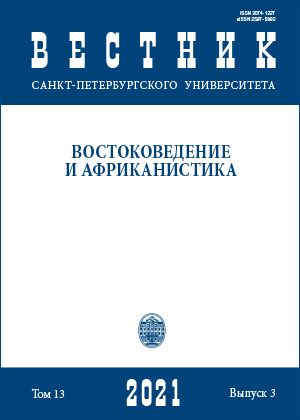Confucian Exegetical Thought in the Southern Dynasties Period (420–589): Canonical Texts and Commentaries between Decline and Restoration
DOI:
https://doi.org/10.21638/spbu13.2021.304Abstract
The article examines the main trends in Confucian exegetical thought during the Southern dynasties period. Confucian exegesis, as an original intellectual tradition, was in a state of crisis at that time and experienced significant influence both from the syncretic teaching xuanxue and Buddhism. This situation determined the particular popularity of some canonical texts and commentaries and the actual oblivion of others. Losing its monopoly in education, Confucianism often came down to providing ritual ceremonies at court. The article examines several aspects of this crisis state of southern Confucianism. It identifies and analyzes a new type of commentary that appeared in the exegesis of this period, and it explores the main intellectual tendencies in the Confucian exegesis of the Southern dynasties period and traces the reasons for their appearance. The author examines features of subcommentary-yishu, through which scholars realized new forms of intellectual activity. This commentary originated from Buddhist monks’ translation and teaching activities approximately in the mid-5th century AD. In the exegesis of the Southern dynasties, yishu provided a platform for relatively free philosophical discussion, often associated with the practice of lecturing. It is important that this practice in Confucianism and Buddhism of that time had many common features. The changes in the educational standard (the emergence of schools with a new structure) are traced as well as its influence on the position of Confucian commentary in the educational process (apparent instability of the set of authoritative commentaries).
Keywords:
Confucian exegetics, Classical studies, Confucianism, jing xue, Five Classics, commentary, Southern dynasties
Downloads
References
Downloads
Published
How to Cite
Issue
Section
License
Articles of "Vestnik of Saint Petersburg University. Asian and African Studies" are open access distributed under the terms of the License Agreement with Saint Petersburg State University, which permits to the authors unrestricted distribution and self-archiving free of charge.





